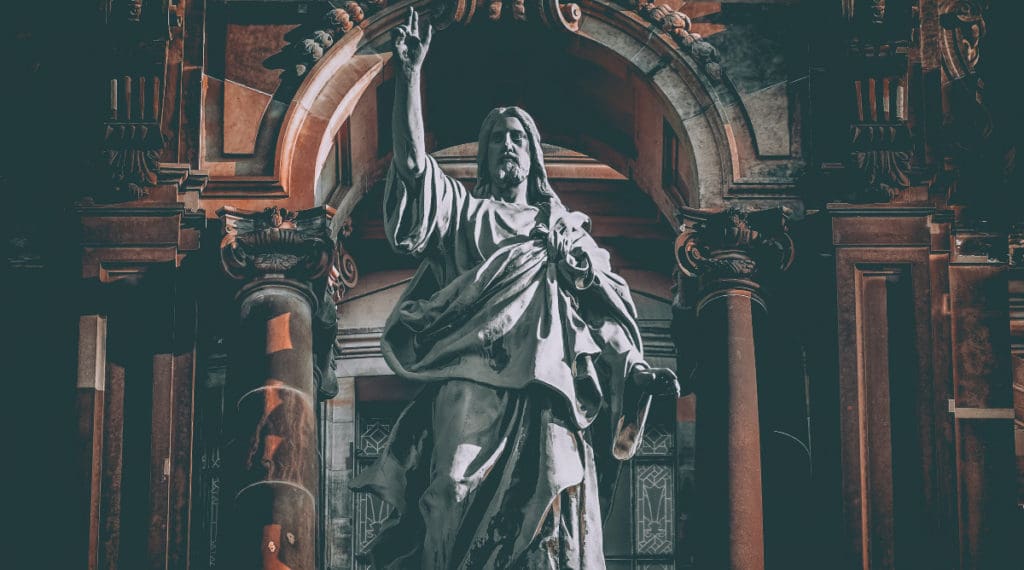Editor’s note: This article is part 9 of a series, “The Kingdom of Grace.” Part 8 can be found here.
The goodness of God, and the greatness of his life as Father, Son, and Holy Spirit, is rather far beyond all telling. God has revealed the mystery of his Triune Life to us, and we believe in the mystery by faith, but before the splendor of the Trinity we are like little children who babble and barely know how to use words.
Yet, it pleases God to transmit to our hearts something of his own divine Life. As friends of God by grace, one of the first and greatest treasures he transmits to us is his holy Name dwelling in our hearts.
Christians of the first generations knew that something new, something stupendous, something supernatural had been given to them by grace. By faith and by personal experience, they were vividly aware that thanks to the death and resurrection of Jesus the Spirit of Love had been poured into their hearts (Rom. 5:5). The Spirit was now living and dwelling in the depths of their souls and the telltale sign of his indwelling was the pronouncement of the Name.
The telltale sign of his indwelling was the pronouncement of the Name.
Which name? The Spirit of sonship has been sent into our hearts, Saint Paul tells us, and makes us cry “Abba! Father!” (Rom. 8:15; Gal. 4:6). The Name, however, might also be that of the Lord Jesus as we find at the end of the Book of Revelation: “the Spirit and the Bride say ‘Come…Come, Lord Jesus!’” (Rev. 22:17, 20). But the Name might be simply that of God. The desert Fathers of the fourth century tell us the formula for ceaseless prayer. It was Psalm 70:1: “O God, come to my assistance, O Lord make haste to help me.” The ancient monks teach us to call constantly upon the name of God using those words. It was the formula handed down among them for generations, and to this day it is the first line of every divine office in the Latin Rite. For the ancient Christians, though, it did not matter so much which particular word was pronounced – either God or Abba or Lord Jesus. What mattered was that the mystery of the Name was now living and active in our hearts by grace.
What is this mystery of the Name? One of the earliest documents of sacred tradition outside of Scripture is called the Didache (c.50-70 AD). It hands on in summary fashion the teaching of the twelve apostles. Even a quick reading shows how much it overlaps with the Gospels (it is even identical at certain points), and it contains some of the earliest details of the liturgy on record. After receiving holy communion, the earliest Christians offered up prayers of thanksgiving, and among them was the line: “We thank thee, Almighty God, for having caused thy holy Name to dwell in our hearts” (Didache 8:10).
In the ancient context, it was understood that there is much more to a name than simply being a word to pick someone out of a crowd. A name was not a digital data point, but was somehow the person’s very identity, presence, and energy. That is why in Scripture name changes are so significant: Abram becomes Abraham, Jacob becomes Israel, Simon becomes Peter, Saul becomes Paul. The name change means becoming, in some sense, a new person. (In many religious communities, the custom of the new name is still in effect upon entering into the novitiate.)
In Scripture, names are to be handled with care. The Israelites worshipped the name of God (Ps. 138:2), were prohibited from abusing the name of God (Ex. 20:7), and were forbidden even from calling upon the names of other gods (Ex. 23:13). To abuse the name of God would be to break the covenant with him, and to call upon the names of other gods would produce relational entanglement with demons working through idols (1 Cor. 10:20). In Scripture, names are not just for texting or indexing, but are actual sacramentals. They are sacramentals of a person.
There is power, therefore, in the Name.
There is power, therefore, in the Name.
The Name is, in a way, the very person and presence of God. When God gives us the grace of the Holy Spirit, the Spirit causes the Name to dwell in our hearts. What happens is that the very person, presence, and power of the living God comes to be reproduced in the depths of our hearts. The likeness of God produced in our hearts by grace is not like a photocopy. It is not a second reality distinct from the original. The likeness – the Name – somehow is the original. The Name is at work in our hearts to cleanse, heal, purify, renew, deliver, and transform us.
Saint Simeon of Thessalonica celebrates the wonders of the Name of Jesus when he says it is “a confession of faith, conferring upon us the Holy Spirit and divine gifts, cleansing the heart, driving out devils. It is the indwelling presence of Jesus Christ within us, and a fountain of spiritual reflections and divine thoughts. It is remission of sins, healing of soul and body, and shining of divine illumination; it is a well of God’s mercy, bestowing upon the humble revelations and initiation into the mysteries of God. It is our only salvation…”*
The experience of the saints down through the centuries is that the indwelling of the Name is a wondrous gift indeed. Thanks to the Name living and active in our hearts, no one is bound to live alone. No one is bound to do life all on his or her own with all of its challenges and difficulties. No one is bound to fix himself. No one is bound to save himself. And no one really can. The Name has come to dwell in our hearts, and the Name works wonders. In the Name of Jesus, there is power unto salvation for all who believe (Rom. 1:16).
The Name has come to dwell in our hearts, and the Name works wonders.
It is time for everyone in the Church today to wake up to the reality that the first Christians knew so vividly. It is time to become aware of the grace of the Name dwelling in our hearts. It is time to call upon the Name day and night. Simply to say the holy Name of Jesus, from a heart full of faith, is to make personal contact with the living God in the depths of the soul. Every time we say the Name, it begins to work the wonders of God within us. Through practice and experience, we can learn anew the wonders of the Name planted in our hearts, and come to echo once again the prayer of the earliest Christians: “we thank thee, Almighty God, for having caused thy holy Name to dwell in our hearts.”
* Simeon of Thessalonica, The Art of Prayer: An Orthodox Anthology. Translated by E. Kadloubovsky and E.M Palmer. (London: Faber and Faber, 1966): p.88-9
Father James Dominic Brent, O.P. is a Dominican Friar who lives and teaches at the Dominican House of Studies in Washington, DC. Several of his homilies, spiritual conferences, interviews, and radio spots can be found on his personal Soundcloud site. He frequently lectures for the Thomistic Institute and appears on Aquinas 101.
Image courtesy of Unsplash.




